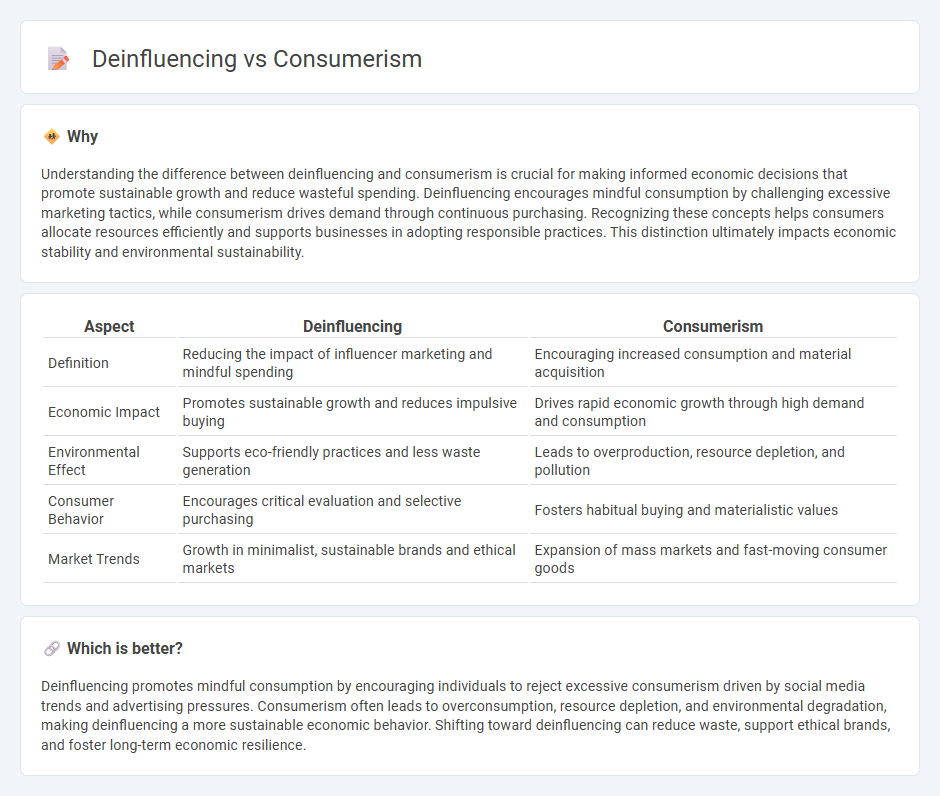
Deinfluencing challenges traditional consumerism by encouraging individuals to resist pervasive advertising and make more mindful purchasing decisions. This shift impacts economic patterns by potentially reducing unnecessary consumption and promoting sustainable market behaviors. Explore how deinfluencing reshapes the future of economic growth and consumer habits.
Why it is important
Understanding the difference between deinfluencing and consumerism is crucial for making informed economic decisions that promote sustainable growth and reduce wasteful spending. Deinfluencing encourages mindful consumption by challenging excessive marketing tactics, while consumerism drives demand through continuous purchasing. Recognizing these concepts helps consumers allocate resources efficiently and supports businesses in adopting responsible practices. This distinction ultimately impacts economic stability and environmental sustainability.
Comparison Table
| Aspect | Deinfluencing | Consumerism |
|---|---|---|
| Definition | Reducing the impact of influencer marketing and mindful spending | Encouraging increased consumption and material acquisition |
| Economic Impact | Promotes sustainable growth and reduces impulsive buying | Drives rapid economic growth through high demand and consumption |
| Environmental Effect | Supports eco-friendly practices and less waste generation | Leads to overproduction, resource depletion, and pollution |
| Consumer Behavior | Encourages critical evaluation and selective purchasing | Fosters habitual buying and materialistic values |
| Market Trends | Growth in minimalist, sustainable brands and ethical markets | Expansion of mass markets and fast-moving consumer goods |
Which is better?
Deinfluencing promotes mindful consumption by encouraging individuals to reject excessive consumerism driven by social media trends and advertising pressures. Consumerism often leads to overconsumption, resource depletion, and environmental degradation, making deinfluencing a more sustainable economic behavior. Shifting toward deinfluencing can reduce waste, support ethical brands, and foster long-term economic resilience.
Connection
Deinfluencing challenges traditional consumerism by encouraging intentional purchasing and reducing impulse buys driven by social media trends. This shift promotes mindful consumption patterns, emphasizing quality over quantity and fostering economic sustainability. As a result, companies adapt by focusing on authentic marketing and durable products to meet evolving consumer demands.
Key Terms
Demand
Consumerism drives demand by encouraging continual purchasing and valuing material possessions, often fueled by advertising and social trends. Deinfluencing shifts this perspective by promoting mindful consumption and reducing impulsive buying, emphasizing quality and sustainability over quantity. Explore the impact of these contrasting forces on modern market demand and consumer behavior.
Sustainability
Consumerism drives excessive resource consumption and environmental degradation, intensifying climate change and waste challenges. Deinfluencing promotes mindful purchasing, encouraging sustainable consumption and reducing ecological footprints by prioritizing quality over quantity. Discover how embracing deinfluencing can foster a more sustainable future and transform everyday choices.
Behavioral Economics
Consumerism drives individuals to acquire goods and services driven by psychological motivations such as social status, instant gratification, and perceived value, deeply rooted in behavioral economic principles like the scarcity effect and loss aversion. Deinfluencing acts as a counter-movement, encouraging mindful consumption by challenging impulsive buying patterns and leveraging cognitive biases such as choice overload and social proof to promote restraint. Explore the dynamics between consumerism and deinfluencing to better understand how behavioral economics influences purchasing decisions and consumer welfare.
Source and External Links
Consumerism - Wikipedia - Consumerism is a socio-cultural and economic phenomenon typical of industrialized societies, characterized by continuous acquisition of goods and services beyond basic needs, with significant cultural, social, and identity implications, as well as environmental impacts like overconsumption and waste.
A Brief History of Consumer Culture | The MIT Press Reader - Consumerism in America took shape in the 1920s, driven by advertising which created demand and status association with material goods, though critics like John Kenneth Galbraith warned about the environmental toll and unsustainable growth of consumer appetite.
Unlearning Consumerism: Liberating the Greedy Mind - Consumerism shapes self-identity around possessions, fostering greed and dissatisfaction through advertising, leading to addictive consumption patterns that define the ego and perpetuate material craving and environmental harm.
 dowidth.com
dowidth.com